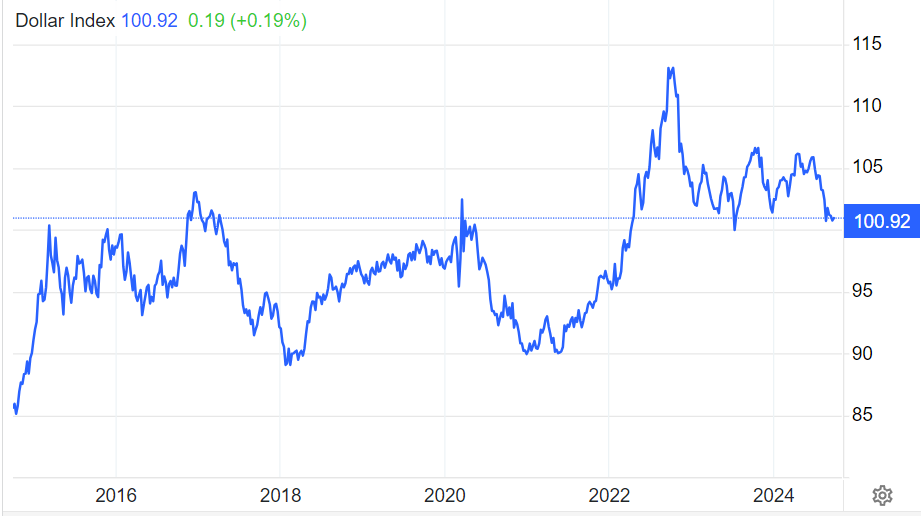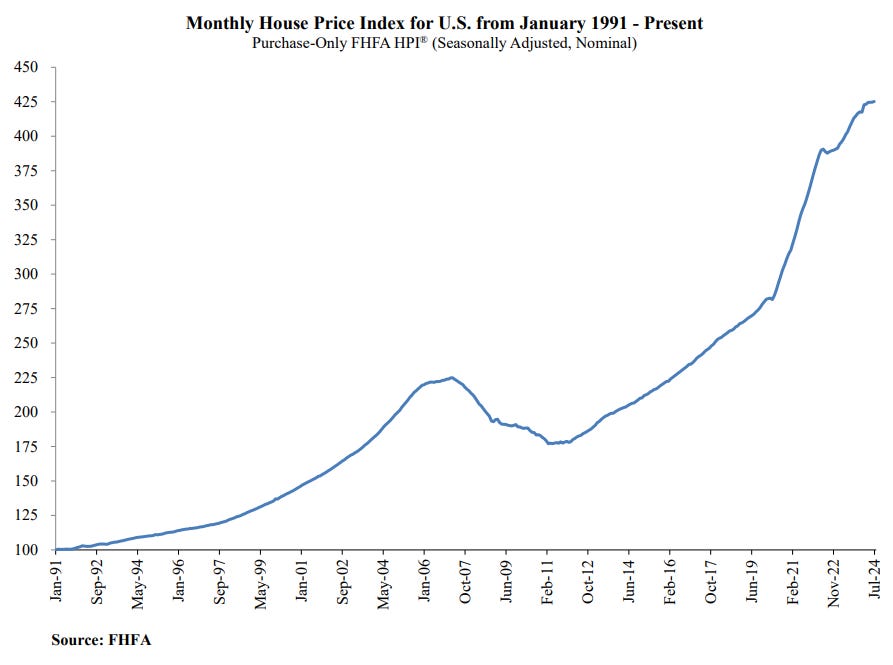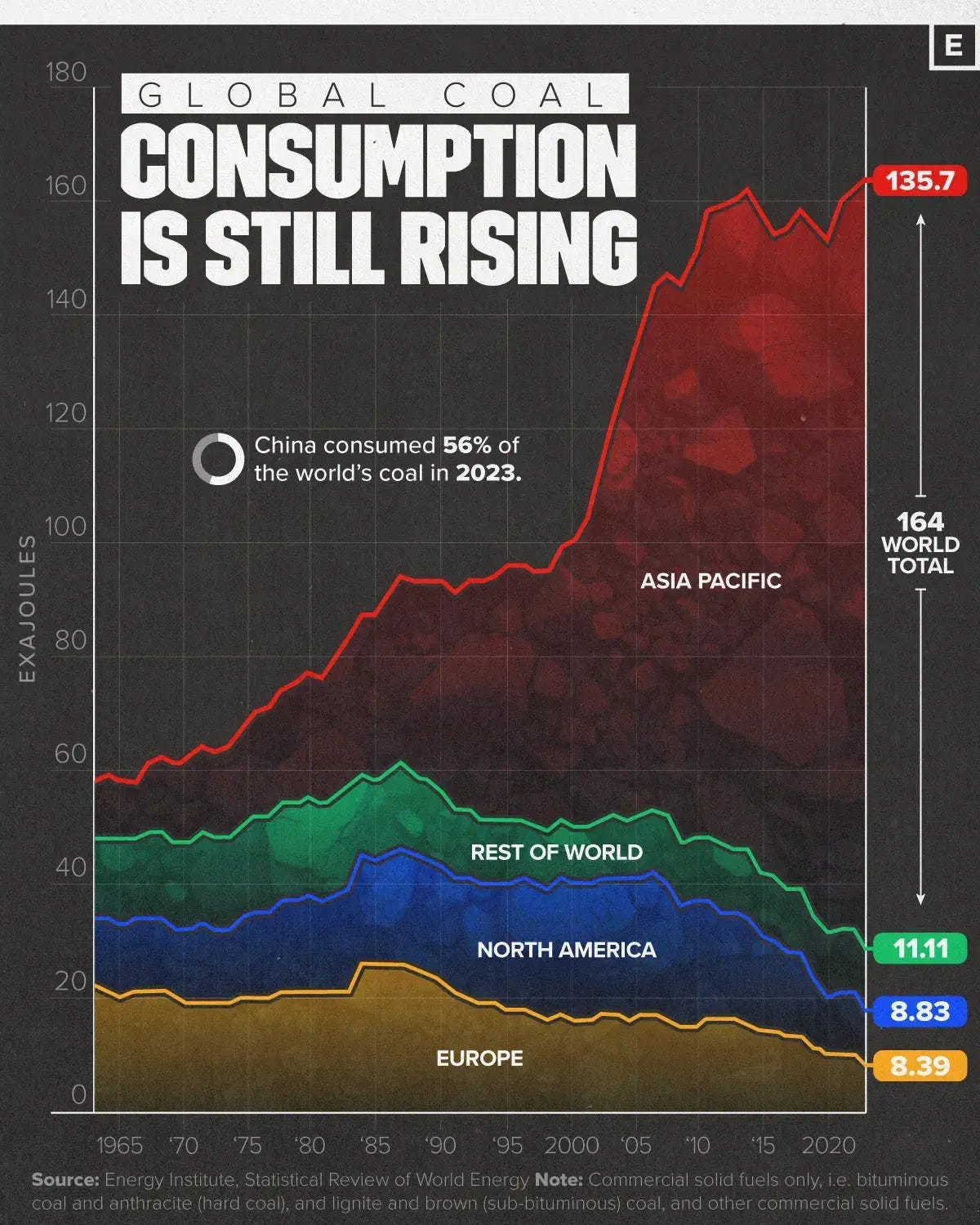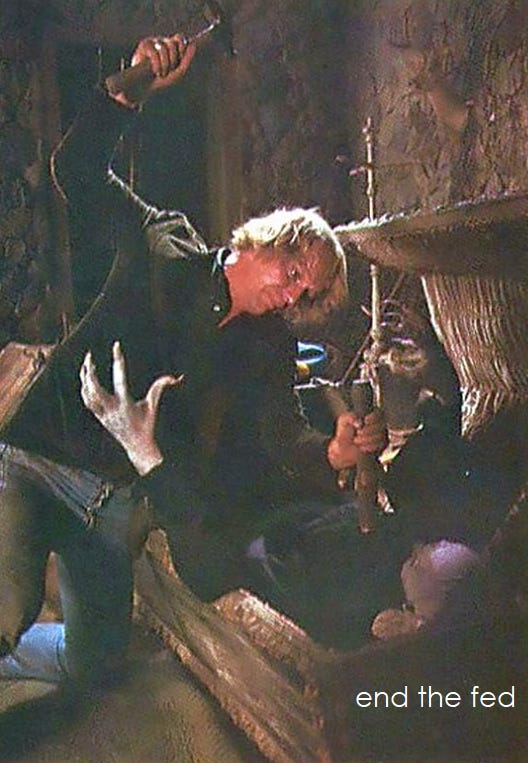The Fed Wants Your Cost of Living to Go Up.
We can never recapture the purchasing power of the dollar that has been lost.
“We can guarantee cash benefits as far out, and at whatever size you like, but we cannot guarantee their purchasing power.”
Alan Greenspan, discussing Social Security, February 16, 2005
Well, it’s been a week since The Most Important Fed Decision of Our Time® (or at least of the month. The next Fed decision is in just 43 days!!!!)
The 30-year mortgage rate is off its recent peak near 8%. At 6.19% this is about one -percent below long-term averages - i.e., if we include years before the insanity of ZIRP and massive QE.
The problem remains that house prices are too expensive (see the FHFA chart below the fold).
Meanwhile, the two-year yield is at its lowest level in…two years.
The unpopular (except among Central Banks) pet rock “Gold” keeps making new nominal highs…
The dollar is looking weak - and this is against pathetic competition.
And stocks have reached what looks like a permanently high plateau.
(If anyone would like a semi-log version of the above SPX chart, please feel free to make your own.)
Peter Boockvar - one of my favorite market observers - posted this Monday:
“Once purchasing power is lost, it is lost forever, and Federal Reserve Governor Chris Waller inadvertently made that perfectly clear when he spoke on Friday. He told CNBC in an interview that "What's got me a little more concerned is inflation is running softer than I thought." He's 'concerned' after we just experienced a 21% jump in the cost of living since February 2020? Tell that to the shopper at Walmart or Dollar General.
Remember 'average inflation targeting'? That was a policy that the Fed implemented in August 2020 and turned out to be one of the most disastrous policy initiatives in their history dating back to 1913. It was defined as this, "On price stability, the FOMC adjusted its strategy for achieving its longer-run inflation goal of 2 percent by noting that it "seeks to achieve inflation that averages 2 percent over time." To this end, the revised statement states that "following periods when inflation has been running persistently below 2 percent, appropriate monetary policy will likely aim to achieve inflation moderately above 2 percent for some time." We know that policy initiative completely blew up on them.
Governor Waller implicitly confirmed that this inflation symmetry policy is out the window as if they stuck to it, they would have to tolerate a period of time of deflation in order to 'average' out the recent period of high inflation at 2%. I'll include a chart here again of how much inflation rose above its long term trend line and say again, once purchasing power is lost, it is lost forever because central bankers won't let you get it back.
Rudy Havenstein, I think you'd agree.” [I do]
CPI index since the 1970's vs its trend line:
Here’s then St. Louis Fed President Jim Bullard, on the Fed’s idiotic Average Inflation Targeting strategy, in January 2020, PRE-Covid:
How anyone watching this video could still think that the Fed should not be disbanded is beyond me (I know, it ain’t gonna happen…)
Anyway, there are some great market observations below from the likes of Jim Grant, Greg Weldon, James Lavish, Ted Oakley, Luke Gromen, and Nikita Krushchev, plus a particularly good interview with Dr. Komal Sri-Kumar, who really stands up for the little guy - such a rare thing among Wall Street types - in a chat with Ash Bennington.
Also I have the usual potpourri of news items on CRE, housing, music, etc. Hope you find something you enjoy.
I am well aware that I have been, over the years, waging a quixotic battle against further currency debasement, which at this point is like trying to stop incoming tide. My posts on the topic are for my amusement, and for future historians, if there are any.
My pseudonym was intended as a warning, not encouragement, but here we are.
I’m sure most of you are smarter than me at figuring out what that means over the next five or fifteen years. Buy things Central Banks can’t print - but don’t get too overleveraged in the process. While leverage is wonderful when everything is going up (just ask Barry Sternlicht), during the periodic blips in the long march to utter currency debasement, there are periods when you don’t want to be forced to sell at the bottom.
If you’re into high strangeness, check out Richard Hatem’s take on “disclosure” - which mirrors my own views on the topic.
Let’s be careful out there.
The Federal Reserve WANTED our cost of living to spike.
This is from the August 1955 FOMC meeting, a quote from the longest-serving Fed Chair, William McChesney Martin Jr.:
‘‘If a judgment is sufficiently wise, it is practicable to restrain a situation before it develops. It is much more difficult to restrain a condition after it has developed. By acting after the fact . . . your action becomes a form of punishment for what has happened, and that is not feasible in a democracy. We can never recapture the purchasing power of the dollar that has been lost.”
“The average expansion of the money supply since 1971 is over 7%. It's a lot different than the reported CPI, and so that's why people feel this. They're like, it doesn't feel like my groceries is up 2%, feels like they're up like 20% from last year, and 40% or 50% from two years ago, and then you see everybody on Tik Tok showing the same exact the same exact things I bought two years ago and - oh my God - my grocery bills up 50%, 100%. That's not fake. That's the reality.”
Great comment from reader RationalWalk:
“The writing is on the wall: Inflation of 2%, using a highly flawed benchmark, is now the absolute FLOOR going forward. Periods of massive overshoots will never be counteracted by periods where the Fed seeks inflation under 2%. They have learned nothing whatsoever from the past four years. And they are nothing if not political. 25 bp was the central expectation until Sen. Warren called for 75 bp a few days ago and the “compromise” was Greg Ip of the WSJ browbeating the Fed (in an editorial masquerading as a “news” article) to cut 50 bp early this week. I guess there’s a need to make Americans feel better off over the next seven weeks in order to “save our democracy” etc.”
"Not one single Fed member envisions a scenario where inflation rises above two and a half percent - when you're currently at three?! Hello?"
“50 bp cuts are almost always reserved for serious economic downturns requiring a sharp jolt of monetary stimulus. But there is no data pointing to any such slowdown. There is, however, an election roughly six weeks away and the cut made a mockery of claims by the Fed that it is apolitical…
Our highly politicized central bank leads America from one financial bubble to the next while enabling the piling-on of tens of trillions of debt that is destroying the country’s financial fabric & economic future. Those praising this corrupt & self-destructive regime are short-timers trying to line their own pockets while participating in the debt-driven destruction of the economy. Nobody is fighting for long-term prosperity.
So whatever the Fed and its apologists want to claim was the reason for the big cut and the additional cuts coming over the next year, there is no data-based justification for lowering rates aggressively. There is a serious problem to be addressed - grossly excessive public & private sector debt - that will only grow with lower rates unaccompanied by any other reforms. But cutting rates only exacerbates that problem which is systemic and existential.”
“I think this Fed - these seven people on this board - all seven are basically academics. I don't think they'll have any idea how to deal with stagflation…Bowman is the only person that has any true banking experience…Powell has a little, he's had Wall Street experience, but the other five - they're academics. They have no idea what's going on on Main Street…”
Jim Grant
“As I heard it, what Chairman Powell said was the economy is great, the job market is great, and, uh, let's cut rates as if there were a recession. To me the striking thing is the disconnect between the state of things as one sees them on the one hand, and the Fed's action on the other. One-half of one-percent, with the stock market at or near all-time highs, with what we call in the trade credit spreads - meaning the price you pay for taking a risk in the bond market - those near certainly cyclical lows. Everything is great, except we're going to make this somewhat outsize cut, and I didn't hear a reason for that.”
“I don't doubt that within the Fed there is a not so secret rooting interest for the Democratic Party”
“As recently as June 2021 the governors and the FOMC projected a fed funds rate of one-half of one-percent in 2023, 50 basis points. It was about zero at the time, and the CPI was rising by almost 5 1/2%. People then thought, what do they know about inflation? The rest of us see it here. What do they know? Well, they didn't know much, so I'm not sure that the FED is acting on any inside information. I think that it is acting on a sense of confidence derived from I don't know what.”
"Never drive down the most sensitive and arguably consequential prices in capitalism - interest rates - to 0%, thereby fomenting a great financialization of the entire country."
“The impossible position of being the keepers both of the labor market and of price stability. Can't do both in my opinion.”
Jerome Powell, September 22, 2021
“I guess the inflation rates for next year and 2023 were also marked up, but just by a couple of tenths. Why—those are very modest overshoots. You’re looking at 2.2% and 2.1%, you know, two years and three years out. These are very, very—I don’t think that households are going to, you know, notice a couple of tenths of an overshoot.”
Luke Gromen makes a hypothetical case - if we were honest and mature about our situation.
This scenario will never happen, of course, so you will be paid your "benefits" - but the purchasing power of the currency will be trashed. It's still a default.
For more on this, see Felix Somary’s comments in The Raven of Zurich.
“People will tell you for the rest of their lives that -- hey, I'm long-term oriented! I'm long-term oriented. As soon as they lose money, they are short-term oriented.”
“I always think that GDP is such a weird measure, because if you increase your government debt, you increase your GDP, but, you know, it doesn't mean you create growth.”
Dr. Komal Sri-Kumar
Great interview (but the constant ads are extremely annoying)
“Are they catering to employment or are they catering to inflation, or are they catering to their future employers in the private sector? Because once they leave the Federal Open Market Committee, they need jobs. Are they interviewing right now, or they conducting policy? that is my concern as to how the members are operating.”
“Think about a hypothetical member of the Federal Open Market Committee - he or she is being faced with a lot of inquiries for meetings and discussions, and think about how many people earning $25,000 a year or less that they meet with on a regular basis to get their views on the economy, how much how their life is going, compared with the people who have hundreds of millions of dollars in net worth - more than a billion dollars in net worth in some cases, and they talk to them. Who do you think they talk to the most? It's the latter, so while you have Jerome Powell coming to every Federal Open Market Committee, he sheds tears - I almost feel like I should help him out with some tissue because he begins by telling us how concerned he is by the pain suffered by the lower income family from inflation - that used to be the refrain. Then of course you can go on to do whatever you want. You can do things where you don't allow for inflation to come down further, and that's where we are. The Fed is not really catering toward the lower income people, despite all their protestations, they are not catering to bringing down inflation, which is part of the mandate. The concern, the focus has been on again stimulating the equity markets up, which is not part of their mandate so those are all the concerns I have collectively with the way they are conducting policy.”
“When the Fed intervenes, it changes what we in economic terms called relative prices…and when there is a change in those relative prices, the income inequality also increases, and that's what we see, and whether the Fed meant to do that or not, they have essentially increased the social pressures coming from the income differences.”
The Federal Reserve has always picked winners and losers. The overwhelming winners are always people like Larry Fink and Ken Griffin, and the losers are always young people and young families.
On the FOMC
“We don't need any of them. A computer can do the job…but the Fed is a bureaucracy, and they want to intervene and they go in and out to show that they are active. I usually say that I will pay the Federal Reserve voting members more, increase their salary, give them a bonus if they don't come to work, and stay at home. By coming in and doing all of this work, they only make the situation worse.”
“The Fed is acting in the current manner because they don't really have to care about the lower income people. They're not there, they don't talk to them very much, they're not the ones appealing to the Fed, and the higher income groups are cheering them on, because the risk asset prices are rising stock market is doing well, thank you Mr. Chairman. You’re the reason I'm feeling wealthier than I was a year ago. Isn't inflation going up? Is the price of milk going up, and eggs going up? Hey, I have hundreds of millions of dollars of net worth. Do you think I worry about the price of milk? That is somebody else's problem. Wee are much better off with financial assets rising in valuation.”
Dave Breazzano, head of credit at Polen Capital, with Jim Grant Breazzano discusses how the worst credits - the CCC rated or unrated debt - are now largely going to private credit, because it’s a better deal for the borrower, with “less covenants and a lower yield.” Jeff Gundlach makes the same point in my post here.
“Despite high borrowing costs and rising cap rates slowing commercial real estate deals, CRE mortgage debt grew by $31.4 billion in Q2, reaching $4.69 trillion.”
“South Bay Development has picked up a seven-building office campus in Santa Clara for $51 million — nearly $100 million less than it traded for four years ago.”
New interview with Anthony Deden (transcript only). For an overview of who Anthon Deden is, this 2018 interview with Grant Williams is a classic.
Via Grants: “It takes one generation to forget the dangers of a bubble, and it is Groundhog Day versus the 1990s Tech Bubble,” Stifel Nicolas chief equity strategist Barry Bannister wrote yesterday. “Just as countries that go rogue become almost un-investable, investors caught in the grips of a speculative fever become almost unanalyzable.”
Consumer Confidence Falls in September
The Conference Board's Consumer Confidence Index® fell in September after notching a six-month high in August. The index declined to 98.7 this month from August's upwardly revised 105.6. This month's reading was worse than expected, falling short of the 103.9 forecast. The Present Situation Index, which is based on consumers' assessment of current business and labor market conditions, decreased to 124.3 from 134.6 in August. Meanwhile, the Expectations Index, which is based on consumers' short-term outlook for income, business, and labor market conditions, fell to 81.7 from 86.3 in August. Note that a level of 80 or below for the Expectations Index historically signals a recession within the next year.
CRE is back, baby!?
The Commercial-Property Market Is Coming Back to Life
“At what price will beaten-down offices, apartments and other properties actually change hands? Signs abound that there will soon be an answer. With prices down 19% from a peak in 2022, the commercial-property market is starting to come to life.”
Remember, in our last episode, Chad Carpenter said that in 2024 the average percentage loan loss for CMBS over the past 12 months has been 62%.
Hmmm
A historic commercial building in Chicago that served as the home for Robert Morris University Illinois has been assessed at a value of only $9.2 million, less than a decade after its value was appraised at $76.5 million at the time of its commercial mortgage-backed securities (CMBS) loan issuance. Morningstar Credit reported Thursday that 401 South State Street — a 487,022-square-foot office property in Downtown Chicago — is now valued at far below its appraised “dark value,” meaning the building’s current value is less than what it had been valued at had it been completely empty upon securitization.
The most recent appraisal gave 401 South State Street a dark value of $46.5 million at the time it got its CMBS loan in 2016, according to Morningstar. The building’s sponsor, Rampante Realty, had defaulted on its $47.8 million CMBS loan originated by Deutsche Bank (DB) in 2020…Rampante bought the asset in 2016 for $68.1 million, put $5.5 million worth of upgrades into it, and unsuccessfully tried to sell it for $100 million in 2019, according to The Real Deal.
Apparently Rampante is owned by Steve Cuculich, “a renowned Tampa Bay philanthropist and owner of Car Credit Tampa.” Deutsche Bank is owned by the U.S. Taxpayer, at least the liabilities part.
This graph shows the Architecture Billings Index since 1996. The index was at 45.7 in August, down from 48.2 in July. Anything below 50 indicates a decrease in demand for architects' services. This index has indicated contraction for 22 of the last 23 months. Note: This includes commercial and industrial facilities like hotels and office buildings, multi-family residential, as well as schools, hospitals and other institutions.
This index usually leads CRE investment by 9 to 12 months, so this index suggests a slowdown in CRE investment into 2025. Note that multi-family billing turned down in August 2022 and has been negative for twenty-five consecutive months (with revisions). This suggests we will see a further weakness in multi-family starts.
Old King Coal
Feds and State AG Investigate an Alleged Human Trafficking Empire Run in Springfield, Ohio
“Dispatches from Springfield, Ohio – The story in this town is not about cats or dogs. It’s about mules. It’s a twin tragedy of migrant workers from Haiti exploited and locals from Springfield marginalized. Just about every week since 2019, First Diversity Staffing Group Inc. has shuttled vulnerable Haitian migrants in unmarked white Ford and Chevy vans from Florida to Ohio, where they are allegedly exploited for cheap labor by companies like Dole Food Company Inc. It is a secretive and sinister operation that has gone unchecked for more than five years. The mastermind behind this scheme lives in a $1.35 million mansion on Pawleys Plantation Court. His name is George Ten, but in that underworld, his nickname is "King George," because of his opulent lifestyle of luxury cars, cash handouts and fast-talk. For years, he has operated his reign of alleged exploitation openly and freely out of a former mansion on E. High Street.”
Richard Hatem
Note that the link below to the Richard Hatem interview on the “Paranormal Podcast” has been deleted (as of May 2025) - emphasizing the need to save locally anything you want preserved. We lose so much digital history every day. Audio is here.
“Communion by Whitley Strieber - in rereading the book in preparation for the episode, I realized how much my feelings had evolved, because when I read that book in 1990, my whole understanding of was with the 100% assumption that he was being physically kidnapped by physical creatures that lived physically on another planet somewhere, and that these were full-on extraterrestrial biological entities - and this was not a developed theory, or philosophy - this was just that so much of the culture framed it that way. That that is how I received it.
It wasn't until John Keel, much later in the ‘90s, when I started reading his books, and he started talking about the idea of the ultraterrestrials, where they may be visiting from other dimensions. This may not be creatures traveling light years across physical distance. They may be coming through portals from other dimensions, and and it it was only then that I began to think - oh, that's interesting.”
This is pretty much my view of the entire UAP subject, re: the U.S. government:
“I've been pretty vocal about not feeling that there is anything to disclosure, because I don't feel there's anything to disclose.”
“Our culture in the West - formed as it is by a faith in science, a reliance on the technological - has convinced us to ignore the unseen. There is a web of connections between visible events and visible, measurable phenomena that we cannot see, cannot measure - so our response has been to ignore this web in favor of what we can see and measure. The blind leading the blind. The drunk looking for his keys under a lamp post because the light is better there.
We know - can describe - the stages of growth of flowers, animals, people…but not the life force itself, the drive: what engineer, inventor and mystic Arthur Young called “the quantum of action.” Of this we know nothing, and are happy to know nothing. And thus we become victims.”
Peter Levenda, The Nine
”As he was out on a walk, something happened when he saw a bully of a carter1 striking his horse about the head. Should he have simply passed on, the man who had made pity the mother of all spiritual vices?
Nietzsche apparently launched himself around the animal’s neck and fervently embraced it. A moment later he was helped away, stricken with apoplexy, and his landlord Davide Fino was on hand to escort him home. Nietzsche remained in a lethargic slumber for two days, then abruptly his body awakened, but the brain remained dormant for ever."
“What makes this inquest significant is that these prisoners represent sinister influences that will lurk in the world long after their bodies have returned to dust.”
Opening Statement before the International Military Tribunal, November 21, 1945
"...sinister forces which profit from the maintenance of international tension are clinging tenaciously to their positions. Though only a handful of individuals is involved, they are quite powerful and exert a strong influence on the policy of their respective States."
Nikita Krushchev: Address to the UN General Assembly, Sept. 23 1960
“someone who had a cart and horse to transport goods.“



























The story about Springfield was a wonderful reminder of what actual journalism looks like.
One would think that the MSM with their million dollar reporters and billion dollar budgets could have figured all that out in a couple of days. It’s a good reminder also that they don’t give a shit about anything really. Only pushing the latest narrative and taking Pharma money. On that note…
Why is it when I think of the MSM (or Mark Elias) a woodchipper pops into my head. Must be one of those ultra-terrestrial things…yeah that’s it.
The August CPI report claimed that “food at home”, aka groceries, inflated at just 0.9% over the past year. None of the MSM reporters will ever investigate whether this is even plausible. Why? The entire system is corrupt, and the MSM is merely a propaganda arm of the Democratic Party. Ultimate proof of that came this summer when, for a few brief weeks, the MSM DID practice journalism by blowing the lid off the lie that the President is just fine mentally. They only did so due to fear of losing the White House for sure, and as soon as Kamala was anointed, they went back to business as usual. None of them are even asking if we have a functioning president, let alone whether groceries really only went up 0.9% over the past year.